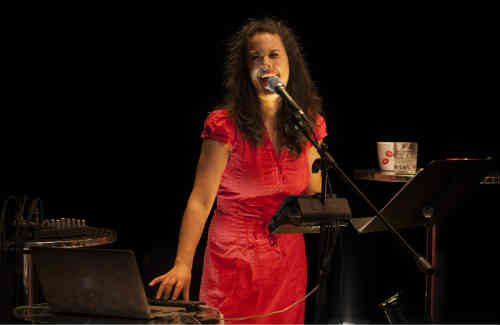
Mouthpiece / Quiver is an extraordinary double-bill, on stage at Toronto Buddies in Bad Times Theatre
Right now, an extraordinary double bill is playing at Buddies in Bad Times Theatre: Mouthpiece, produced by Quote Unquote Theatre and presented by Nightwood Theatre, and Quiver, produced by Nightwood Theatre. Through innovative staging and raw storytelling power, these two shows offer a creative and profoundly moving exploration of the female voice.
These are two of the most urgent and unforgettable plays that I have ever seen. The storytelling techniques and structures in these plays are as bold as the stories themselves; together, Mouthpiece and Quiver offer an extremely cutting-edge night at the theatre.
The double bill begins with Quiver, a story told through the eyes — well, the voices — of fourteen-year-old Maddie, her sixteen-year-old sister B, and their single mother (all played by writer-performer Anna Chatterton). When B announces that she is moving in with her mother’s ex-boyfriend, the family begins to fall apart and Maddie is left on her own to deal with the struggles of growing up.
I was extremely impressed by the unusual staging of Quiver; Chatterton creates the entire play with little more than a microphone and a vocal processor. She controls all the sound manipulation herself, pressing buttons that allow her to call up sound cues, repeat certain pieces of dialogue on a loop, or shift from Maddie’s sweet young voice to her mother’s lower, more sultry one.
For a play without a visual component (that is, we do not see the play happen on the stage in front of us), I thought this was a surprisingly visual play. Chatterton’s facial expressions do an excellent job of portraying each character distinctly, and the audience’s imagination — that ancient, powerful storytelling tool — takes it from there.
I loved this play’s depiction of the sweetness, confusion, and anguish of adolescence and adulthood alike. Each character deals with her own struggles, and the struggles compound each other in a way that felt honest. I was especially pulled in by Maddie’s heartfelt homages to her fictional archer-heroine.
If I had to say something negative about this play, I would perhaps note the pattern that each female character’s story involves a male character who betrays or disappoints them. Of course, Quiver is premised on a man coming between B and her mother, but it might have been nice to let Maddie have a storyline without a love interest. She already had many other problems to deal with.

Mouthpiece had my attention from the very beginning. The play opens with creator-performers Norah Sadava and Amy Nostbakken singing a haunting a cappella harmony into total darkness; the perfect setup for a story told through words, song, and silence.
Mouthpiece centers around the main character, Cass (played by both Sadava and Nostbakken simultaneously) as she grapples with the death of her mother, the mysterious disappearance of her own voice, and what it means to be a woman in a deeply misogynistic world. Using only a bathtub, a microphone, and their own voices and bodies, Sadava and Nostbakken bring us on an urgent and unforgettable journey.
Instead of leading logically from one scene into the next like a traditional play, the storyline in Mouthpiece dissociates from certain moments and obsesses over others. Structurally, this play keeps us on our toes.
Although Mouthpiece tackles serious subjects, it is frequently very funny. The audience loved the voice of the aunt on the answering machine, while my friend Laura and I couldn’t stop laughing at the sudden appearance of the mouth in the bathtub drain. Nothing about grief or identity is simple, and Mouthpiece embraces the challenge of portraying one character, for one day, in all her complexity.
In my opinion, the play’s most profound moment is also the most difficult to watch. This is the long ending sequence in which Sadava and Nostbakken take turns scrambling toward the microphone, only to yank each other back and throw each other to the floor. By the end, Nostbakken is yanking herself back and throwing herself to the floor. I cannot imagine a more perfect depiction of the way women are conditioned to treat each other.
Despite my best efforts, I cannot think of anything critical to say about this play. For me, Mouthpiece was, from beginning to end, simply a virtuosic piece of theatre.
Although Mouthpiece and Quiver are a double bill, tickets to either show can also be purchased individually. I highly recommend these plays, whether individually or together; their stories are often playful, often painful, and always deeply human.
Details
- Mouthpiece and Quiver are playing until Nov. 6, 2016, at Buddies in Bad Times Theatre (12 Alexander Street)
- Shows run Tuesday through Sunday; see website for show times
- Ticket prices are $45 for the double bill ($41 for people under 30 and arts workers), or $28 for a single ticket to either Mouthpiece or Quiver ($25 for people under 30 and arts workers). Sunday matinees are PWYC. A limited number of $20 rush tickets will also be available at each performance.
- Tickets are available online or through the box office at 416-975-8555
- Note: Mouthpiece uses a fog/smoke effect.
Photo of Amy Chatterton in Quiver by John Lauener; photo of Norah Sadava and Amy Nostbakken in Mouthpiece by Joel Clifton
